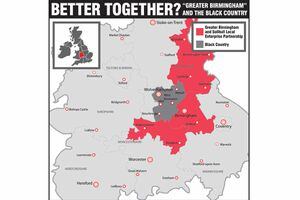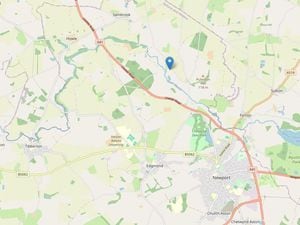Are we all going to become Brummie?
They are just a few miles apart, but for most people the Black Country and Birmingham are as different as faggots and balti.

Yet if they are to bring in the multi-million pound investments that are going to create jobs, business leaders say they are going to have to work together. Could it be under the name Greater Birmingham?
It is an idea that is sure to annoy people in the Black Country who will already be fed up of having to explain that they are not Brummies and are from towns or a city with identities and culture all of their own.
Today there is talk of councils in the Black Country and Birmingham creating one authority to oversee regeneration and marketing – but they will not merge into one.
'Greater Birmingham and Solihull' already exists on paper. It is the name of the Local Enterprise Partnership – a group of councils and businesses that bids for government funding to help drive growth.
And the group includes Lichfield, Cannock Chase and Wyre Forest.
The Black Country has its own separate LEP made up of Wolverhampton, Sandwell, Dudley and Walsall councils.
The LEPs were created in order to abolish the old £300-million-a-year quango Advantage West Midlands – one of nine regional development agencies – after the Government decided they were not value for money.
The four Black Country councils are prepared to work with Birmingham and Coventry on marketing, economic development and European funding.
However, the leader of Wolverhampton City Council has stressed they would all retain their independence and that the move would not be the West Midlands' equivalent of Greater Manchester or the Greater London Authority.
Solihull Council has not backed the idea but the other councils that used to be part of the old West Midlands County Council area are said to be keen.
Lichfield Tory MP Michael Fabricant has sought assurance that Greater Birmingham would not sweep away separate districts and identities.
He revealed he had been in contact with Andy Street, the managing director of John Lewis and the chairman of the Greater Birmingham and Solihull LEP.
In his message to Mr Fabricant, Mr Street said: "This does not mean Lichfield becomes part of Greater Birmingham.
"The districts will all keep their independence. It's a single branding term for the total area so that we can compete against Manchester and London for government funding." Mr Fabricant said: "We don't want to go back to the idea of the old regional development agencies but it is a good idea to co-operate."
Councillor Roger Lawrence, leader of Wolverhampton City Council, is also adamant that it will not mean the end of the Black Country.
He said: "This is not a question of the Black Country being absorbed into Birmingham.
"But there's talk of setting up a combined authority between the seven metropolitan boroughs. It's a question of collaborating on economic development and marketing.
"Solihull Council has not currently shown an interest in a combined authority but the other six are interested. This won't be the old West Midlands County Council. That one had separate councillors elected to it. This one is about existing authorities working together."
Councillor Lawrence appeared before MPs yesterday to discuss 'fiscal devolution', giving councils more control over funding.
He said he did not expect the combined authority to cost more money and believed it would save cash in the long run with councils pooling their resources.
"When you're marketing the region to places like China it makes sense to have a single city region. Obviously if you're talking about specific sites in Wolverhampton like the i54 it needs a Wolverhampton label."
Councillor Lawrence said the idea was a 'long way off' and that it would need the backing of civil servants and politicians in Westminster. The former West Midlands County Council ran from 1974 to 1986 to oversee transport, emergency services and strategic planning. Metropolitan county councils were abolished by Margaret Thatcher's Tories with the party branding them 'a wasteful and unnecessary tier of government'. Ian Austin, MP for Dudley North and a former West Midlands regional minister, said: "There is huge scope for Black Country councils to work together more closely and achieve savings in management and back office costs.
"Where it is about transport, regional planning and other issues that affect all the councils together it makes sense. When Birmingham does well, the Black Country benefits, and when the Black Country does well, Birmingham benefits too."
Pat McFadden, MP for Wolverhampton South East, said the plan needed to ensure the separate identities of each area were protected.
He said: "People are not going to give up their identities but there are times when we all should work together. We could work more effectively to make our economic case and that's what this should be about."





